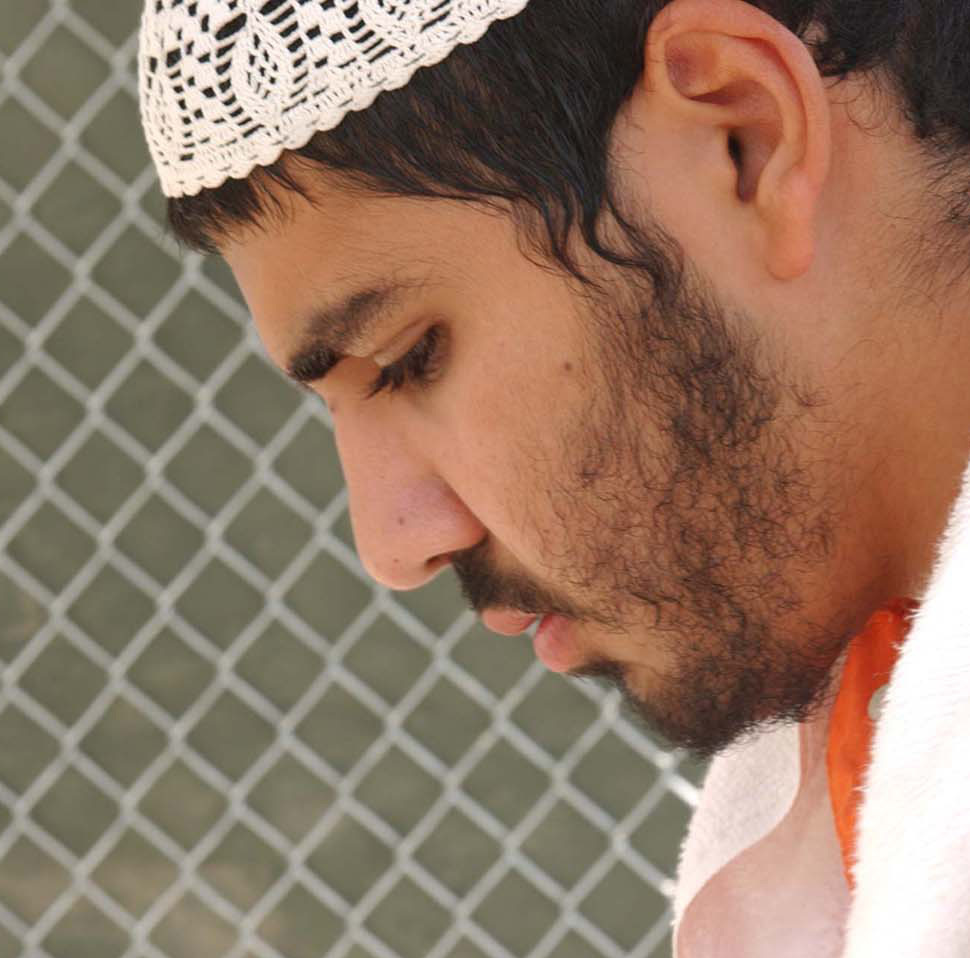Yaser Esam Hamdi, enemy? Having lived in Saudi Arabia for most of his life, Hamdi first encountered the U.S. military in 2001, when the U.S. invaded Afghanistan. As the United States mobilized for the War on Terrorism, Hamdi had naively affiliated himself with the Taliban resistance and prolonged presence in the battlefields, which led to his capture and detention in late 2001.1 As the years went on, the U.S. military declared Hamdi as an ‘unlawful combatant’, which left him to face inhumane treatment during his imprisonment in Guantanamo Bay.2 The treatment of prisoners of war is governed by one of the Geneva Conventions that recognizes the necessity of humanitarian protections for all prisoners during war times.3 Yet, Hamdi’s detainment, as an ‘unlawful combatant’ away from U.S. soil, enabled the U.S. Government to avoid following its own rules and violate the minimal protections that the Geneva Convention Relative to the Treatment of Prisoners of War should have afforded him. The location of Hamdi’s initial detention capitalized on this “legal black hole,” as Guantanamo Bay presented a unique case of leasing land on foreign soil, for which the traditional jurisdiction of the U.S. did not apply. Under the purpose of carrying out operations for the sake of the ‘security of the nation’, the U.S. acted with impunity in Guantanamo Bay and took full advantage of the opportunity to curtail human rights that this presented.4 Hamdi, born an American Citizen, saw his birthright protections denied not just as a Prisoner of war but as he should have been protected as an American.5 Categorizing Hamdi as an ‘unlawful combatant’ de facto removed all these rights and negated his American citizenship.

American troops captured Hamdi in the battlefields of Afghanistan, where Hamdi was fighting alongside the Taliban.6 After his capture, the U.S. military categorized the same way they did for all suspected terrorists. The U.S. Government determined underhandedly that Hamdi had not fought in accordance with the specifications of the Third Geneva Convention.7 The U.S. Military transported Hamdi to Guantanamo Bay Prison in Cuba for detention. There, Hamdi joined another 600 prisoners who had been “held indefinitely, without charges, without counsel, and without access to American Courts.”8 The treatment Hamdi received denied his humanity. Even once a report with contributing information from a visiting CIA analyst exposed openly the type of torture conducted in Guantanamo Bay, the American public sentiment did not change towards the prisoners because many Americans wanted to inflict punishment for the 9/11/2001 attacks (Hamdi had nothing to do with 9/11 but his arrest in Afghanistan was enough to deny his rights too).9 Americans and the Bush Administration held Afghanistan responsible for the Saudi Arabian Terrorists who executed the 9/11/2001 attacks. Therefore, many Americans simply assumed the government was correct in its handling of anyone categorized as ‘enemy combatants’.

However, once the U.S. government came to the realization that Hamdi was an American citizen since his Saudi Arabian mother gave birth to him in Louisiana, the Pentagon transferred him out of Guantanamo into a Virginian Brig, placed under their supervision. Even with the new information shedding light on how to advance such proceedings at the hands of the military, Hamdi did not receive the due process granted by the U.S. Constitution, by his birthright.10 Held in the Brig, with no access to counsel, Hamdi remained in the dark about the charges against him. The U.S. government declared secrecy for all proceedings was required for the sake of safety and security for the country.11 Could the U.S. Government deny a U.S. citizen, right to counsel and due process, as in the case of Hamdi, simply because it considered him an ‘unlawful combatant’? Did the U.S. government have the power to deny a citizen all his constitutional rights whenever determined as an enemy of the state? How far could the government go in calling citizens enemies of the state to effectively deny all the protections given by the U.S. Constitution? It went on for years for Hamdi.
Hamdi started fighting for his constitutional rights. He made repeated attempts to assert his rights. His first two petitions, combined into No. 02-6827, by Frank Dunham and Christian Peregrim were reversed and dismissed, as the Fourth Circuit Court deemed the two individuals ineligible, considering the lacking qualifications in their relations to the petitioner, as found in Hamdi v. Rumsfeld 294 F.3d 598 (2002).12 As the back and forth rulings of the District and Fourth Circuit Courts swung between the necessary precautions for the safety of the nation and the protection of an American individual’s rights, the intervention of the Supreme Court prove necessary.13
Eventually, Hamdi’s father, Esam Fouad Hamdi, joined as petitioner and helped to bring the case before the Supreme Court, with a writ of habeas corpus, No. 02-6895, which his father filed under the given code 28 U.S.C. § 2241, and it was accepted.14 Hamdi’s case was finally able to move forward with the third qualified petition, as the two previous petitions failed due to the lack of a substantial relationship necessary for filing.15 With the ultimate judicial power to determine the case of Hamdi, the precedent set by his case was momentous, for all those involved in the Middle East conflict and any other future conflicts that might befall on the U.S. in the future.16 Even if declared ‘unlawful combatants’, American prisoners can access the same rights and protections from the government, guaranteed in the Constitution for each citizen.17 This casebrought to the forefront the accessibility of habeas corpus.18

On June 28, 2004, the Supreme Court ruled in the favor of Hamdi in a 6-3 ruling, determining his entitlement to some protections granted by the rights like any other American, despite his ‘unlawful combatant’ status. The Supreme Court granted him habeas corpus but allowed his trial to be conducted as a military tribunal which did not afford him a jury of his peers.19 Thus, Hamdi’s case warranted a necessary judicial review so that the Executive cannot alone determine the entire case of a person who fit the same criteria as Hamdi. Justice Sandra Day O’Connor gave the plurality opinion of the court, highlighting the areas of concurrence among the justices, with multiple interpretations spanning the opinion.20
Despite all the judicial proceedings that had taken place for Hamdi’s case, in the end, Hamdi renounced his American citizenship. Given the opportunity to expatriate himself in exchange for his freedom or to remain an American citizen and stay in prison while undergoing a military trial, Hamdi chose to be exclusively a Saudi Arabian citizen. After Hamdi officially renounced his American Citizenship at the U.S. Embassy in Riyadh, Saudi Arabia, he was set free. Hamdi can no longer regain American citizenship because of the restrictions placed on him based on his alleged ties to the Taliban resistance when he was captured in 2001.21 The American citizen who most meaningfully impacted the rules of habeas corpus and the proceedings of the U.S. Military and the U.S. Government when categorized as ‘unlawful combatants’ ended up exchanging his American Citizenship and denied rights for his Saudi freedom instead. This case reaffirmed the true minimum human rights that should be afforded to all U.S. citizens regardless of their actions, the way the U.S. Constitution intended it.
- O’Connor, “HAMDI V. RUMSFELD,” Legal Information Institute (Legal Information Institute, June 28, 2004), https://www.law.cornell.edu/supct/html/03-6696.ZO.html). ↵
- Daniel E. Brannen Jr., Richard Clay Hanes and Rebecca Valentine, <em>Supreme Court Drama: Cases That Changed America</em>, (Detroit, MI, 2011), 694. ↵
- Geneva Convention relative to the Treatment of Prisoners of War, 75 U.N.T.S. 135, entered into force Oct. 21, 1950. ↵
- David C. Carlson, Cuba, (Detroit, MI: 2012), 441-445. ↵
- U.S. Constitution, amendment. I-XXVI, (Philadelphia, PA) entered into force September 25, 1789. ↵
- Encyclopedia of the Supreme Court of the United States, 2008, s.v. “Hamdi v. Rumsfeld, 542 U.S. 507 (2004),” by David Luban, 385. ↵
- International Committee of the Red Cross (ICRC), Geneva Convention Relative to the Treatment of Prisoners of War (Third Geneva Convention), 12 August 1949, 75 UNTS 135, 96-97. ↵
- International Encyclopedia of the Social Sciences, 2008, s.v. “Guantanamo Bay” 393. ↵
- The Encyclopedia of Middle East Wars: The United States in the Persian Gulf, Afghanistan, and Iraq Conflicts, 2010, s.v. “Guantanamo Bay Detainment Camp,” by Stephen A. Atkins. 502. ↵
- U.S. Constitution, art. 1, (Philadelphia, PA) entered into force September 25, 1789. ↵
- Encyclopedia of the Supreme Court of the United States, 2008, s.v. “Hamdi v. Rumsfeld, 542 U.S. 507 (2004),” by David Luban, 385-386. ↵
- United States Court of Appeals, “HAMDI v. RUMSFELD: 294 F.3d 598 (2002): 4f3d5981838,” Leagle (United States Court of Appeals, Fourth Circuit.https://leagle.com/images/logo.png), accessed March 31, 2020, https://www.leagle.com/decision/2002892294f3d5981838. ↵
- Daniel E. Brannen Jr., Richard Clay Hanes, and Rebecca Valentine, Supreme Court Drama: Cases That Changed America, (Detroit, MI, 2011), 694. ↵
- O’Connor, “HAMDI V. RUMSFELD,” Legal Information Institute (Legal Information Institute, June 28, 2004), https://www.law.cornell.edu/supct/html/03-6696.ZO.html. ↵
- Eastern District Court of Virginia, accessed March 31, 2020, http://www.vaed.uscourts.gov/notablecases/hamdi/chronology.html). ↵
- Daniel E. Brannen Jr., Richard Clay Hanes and Rebecca Valentine, Supreme Court Drama: Cases That Changed America, (Detroit, MI, 2011), 694. ↵
- U.S. Constitution, article 1, (Philadelphia, PA) entered into force September 25, 1789. ↵
- Oxford English Dictionary Online, s.v. ‘habeas corpus,’ accessed March 2, 2020, https://www.oed.com/view/Entry/82954?rskey=zreWpy&result=1&isAdvanced=false. ↵
- Daniel E. Brannen Jr., Richard Clay Hanes and Rebecca Valentine, Supreme Court Drama: Cases That Changed America, (Detroit, MI, 2011), 696. ↵
- Daniel E. Brannen Jr., Richard Clay Hanes, and Rebecca Valentine, Supreme Court Drama: Cases That Changed America, (Detroit, MI, 2011), 695. ↵
- Ben Herzog, Revoking Citizenship: Expatriation in America from the Colonial Era to the War on Terror, (New York, 2015), 116. ↵



33 comments
Haley Ticas
Great article! I was unaware of Hamdi prior to this article however this article was very informative and effectively told his story. On the other hand, I was aware of Guantanamo bay, a place for prisoners such as terrorists and war criminals. This prison is known for their inhuman torture methods and lack of freedoms for the prisoners. What happened to Hamdi was truly unfortunate, however it did shed light to the injustices of the justice system and act committed by the government.
Faith Chapman
I’m confused; if Hamdi renounced his American citizenship, what was stopping the US government from placing him back at Guantanamo Bay Prison and resuming his inhumane treatment, as he was still categorized as an “unlawful combatant” at this point (right?), or had the War on Terrorism (or the battle against the Taliban) been effectively concluded and the other prisoners of war had been dealt with already?
Aleea Costilla
Prior to reading this article I did not know of Hamdi’s story, but I was aware of the Guantanamo Bay’s Prison for suspected terrorists. It is terrible that Hamdi had to endure such harsh treatment for his involvement with the Taliban. I understand the group has done many horrible things but the case of Hamdi should not have involved stripping him of his constitutional rights. I was shocked to see he renounced him American citizenship, but his history with American law must have been reason enough to not feel protected.
Oscar Ortega
A truly ethically intriguing article. While Hamdi’s case may be considered contentious, the implications in the grander sense are very disconcerting. Regardless of Hamdi’s actions his treatment and the potential violations of his human rights as well as the stifling of his rights as an American citizen are rather disturbing. Equally so is the idea that the forfeiture of those rights were ultimately what granted him freedom from the extremely questionable conditions he was facing. The only saving grace is the reinforcement of the rights that any American citizen, enemy or ally, is entitled to under our own definitions of liberty and freedom, ensuring that such things cannot happen to anyone again, lest America forfeit its own values.
Alexandria Garcia
This was a very emotional article. It took us from Hamdi being arrested, taken to Guantanamo bay enduring torture and inhumane treatment by the US and its agents. The article’s mood was lightened as we saw Hamdi through his trial to him being given the option to renounce his American Citizenship to be free or keep it and be bound to Guantanamo Bay. The early 2000’s were a very emotional time and held so many sentiments that still are embedded in American history today.
Eric Grant
Thiffany, you did a great job explaining such a nuanced argument. I feel like we can consider this an outlier argument, but by the same token, I feel that this is not as uncommon as we think. The Taliban is a terrorist organization that has explicitly stated its hostility towards the U.S. So as you state, Hambdi “naively” associated himself with the group. I am not making the argument that this gives them the right to violate the rights guaranteed to him by the constitution, but I am pointing out that U.S bureaucracies are sometimes slow and ineffective in seeing outlier cases such as this.
Genesis Vera
This is such a heart-wrenching article. I understand that the Taliban has done some heinous things however I am a firm believer in due process. Personally, I appreciate that this article was written because it shed some light on how we treat our “enemies”. It made me think about what is the “correct” way to go about a situation like this and in some aspects, I do not think the U.S handled this situation fairly, however, this man did know what he was doing and punishment was imminent.
Madeline Chandler
This is such a well written engaging article. A highly informative article that i had never heard any reference to. The United States was very much in a predicament with a U.S citizen that chose to give up his rights by fighting against the country that gave it to him. I agree that Hamdi shouldn’t be given the natural rights of a U.S. citizen since he chose to give them up by fighting with the Taliban. It is ironic to ask for rights you willing fought against the country that gives them. I think the U.S. did violate the Geneva Convention by torturing their prisoners. which no one deserves to be treated cruelly. So I agree with the U.S. in some aspects but not others. Very interesting article!
Aracely Beltran
Interesting article, sadly there are a lot of stories of people like him. People who have to go through this to avoid these things happening to others. America has had a history of doing unjustifiable actions to people who aren’t of the majority group. It was a relief when his dad came to help him after all of his attempts to get justice.
Shriji Lalji
This is a tough situation for the United States. Since he was born a US Citizen he was recruited later while living in Saudi Arabia. Although his rights were taken from him, at least once they realized he was a United States citizen they transferred him. It is disappointing to see an American citizen as a part of the Taliban.